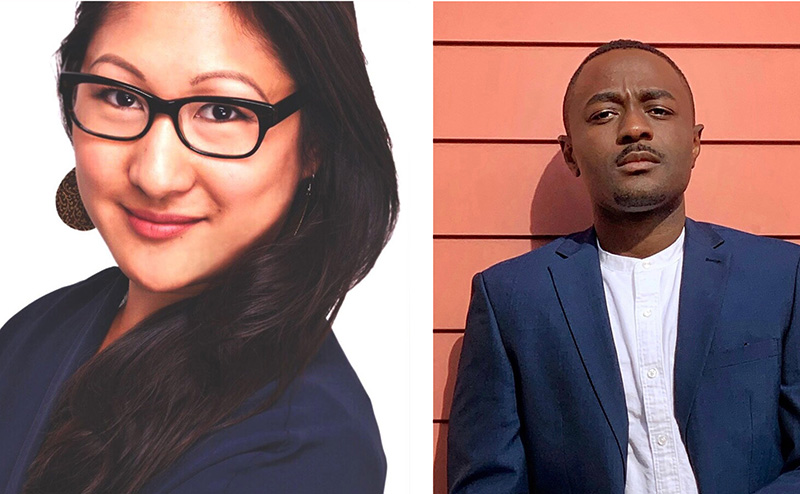- Apply
- Visit
- Request Info
- Give
Biology alumni speak on COVID-19, urge vaccination
Written by Molly Boucher
Published on April 30, 2021
 Eastern Connecticut State University’s Biology Department hosted “Moving Forward: The Pandemic Tales of Two Eastern Alumni,” on April 28. Moderated by Biology Professor Joshua Idjadi, two Eastern alumni from the biology program spoke of their experiences as members of the healthcare profession during the COVID-19 pandemic, including Joanne Michelle Ocampo ’11 and Tunde Olatinwo ’12.
Eastern Connecticut State University’s Biology Department hosted “Moving Forward: The Pandemic Tales of Two Eastern Alumni,” on April 28. Moderated by Biology Professor Joshua Idjadi, two Eastern alumni from the biology program spoke of their experiences as members of the healthcare profession during the COVID-19 pandemic, including Joanne Michelle Ocampo ’11 and Tunde Olatinwo ’12.
Ocampo, who started her presentation by giving background on her experience at Eastern, said that the opportunities presented to her at Eastern, such as abroad trips and field studies, hundreds of hours in biology labs, and personal and professional connections strengthened her education. “Eastern wasn’t just a place where I went to school, it was place where I established substantial professional and personal networking experiences.”
After graduating from Eastern in 2011, Ocampo went on to pursue what she calls a “non-traditional” career path, with a focus on biology, epidemiology, policy and public health. As the pandemic developed, she found her unique set of skills to be extremely useful.
Outside of her academic experiences, Ocampo explained the difficult aspects of living in New York City during the pandemic. She described the constant blaring of ambulances and the lights of the city that kept her awake more than usual. Along with hospitals being overwhelmed in New York, one of the biggest hotspots in the country, she spoke of her experiences volunteering, and the tolls that were taken outside of the virus itself. “I was working as a volunteer distributing food — the food lines were indescribable, stretched around huge blocks,” said Ocampo.
Olatinwo, on the other hand, assisted in COVID-19 relief efforts in Massachusetts. After graduating from Eastern in 2012, he pursued a career in the Air Force, and recently returned to academia; he now works full time in anesthesiology. Throughout the pandemic, Olatinwo has adapted his skills to the different needs of the time, ranging from providing testing for the homeless, contact tracing and now administering vaccines. Though there was an overwhelming number of difficult moments, he said, “It was most heartbreaking to not see people take the virus seriously.”
While both Ocampo and Olatinwo focused their presentations on sharing their experiences in healthcare during the pandemic, they also had interesting perspectives as people of color during this difficult time. Ocampo explained the racism she faced as an Asian woman, saying, “As an Asian woman walking the streets of New York City, I experienced racial remarks at a much higher frequency than usual.”
Olatinwo spoke to his understanding of how African Americans are wary of taking the vaccine. He explained that while the United States has an expansive history of taking advantage of African American communities with medical experiments and false vaccinations, the COVID-19 vaccine is the best route to take in keeping yourself and others safe. He also spoke on his fears of wearing a mask as a black man, especially during the height of the Black Lives Matter movement. He explained that it was difficult to balance, “knowing certain biases exist.”
Although they gave separate presentations, Ocampo and Olatinwo’s points overlapped numerous times during the hour. Both spoke on the ever-changing knowledge of COVID-19, with Ocampo saying, “This public health crisis was a rapidly emerging phenomenon, it’s a lot of educated guessing, and a lot of trial and error.” She also explained the inequity of health care in the United States, and said COVID highlighted the issue, as it has been a persistent issue for the public health community.
Both alumni finished their presentations by encouraging students to get vaccinated, saying that although the vaccine has been politicized, the Centers for Disease Control and Preventions worked to make COVID-19 guidelines apolitical. Olatinwo urged students to follow CDC guidelines, educate themselves, and report if they have any symptoms. He said while he understood concerns, there is a far greater risk of getting serious symptoms from the virus than those developed by the vaccine.
He also urged students and staff alike to continue research into how developing vaccines works, to better understand the speed at which this one became available. “The pandemic isn’t over yet,” he explained. “The biggest takeaway from this presentation is to get vaccinated and do your part.”


